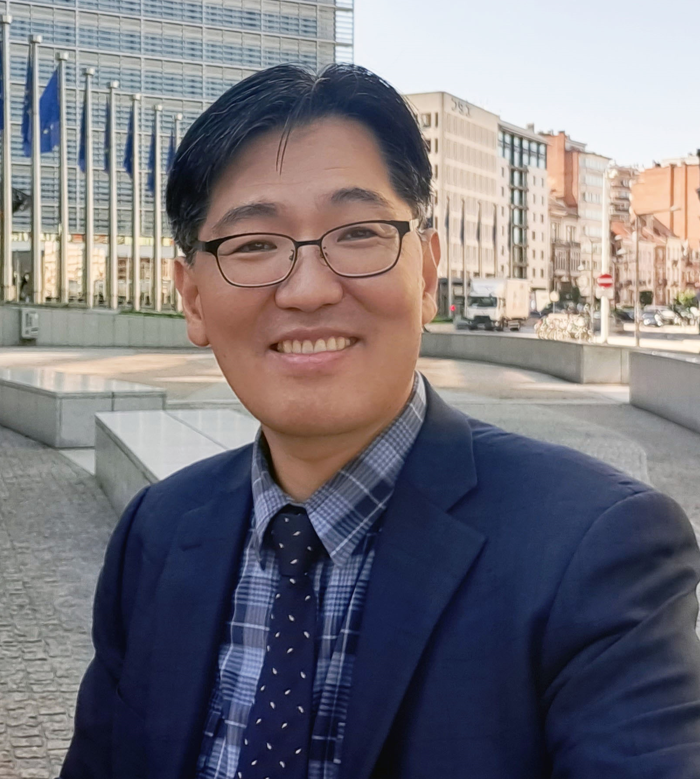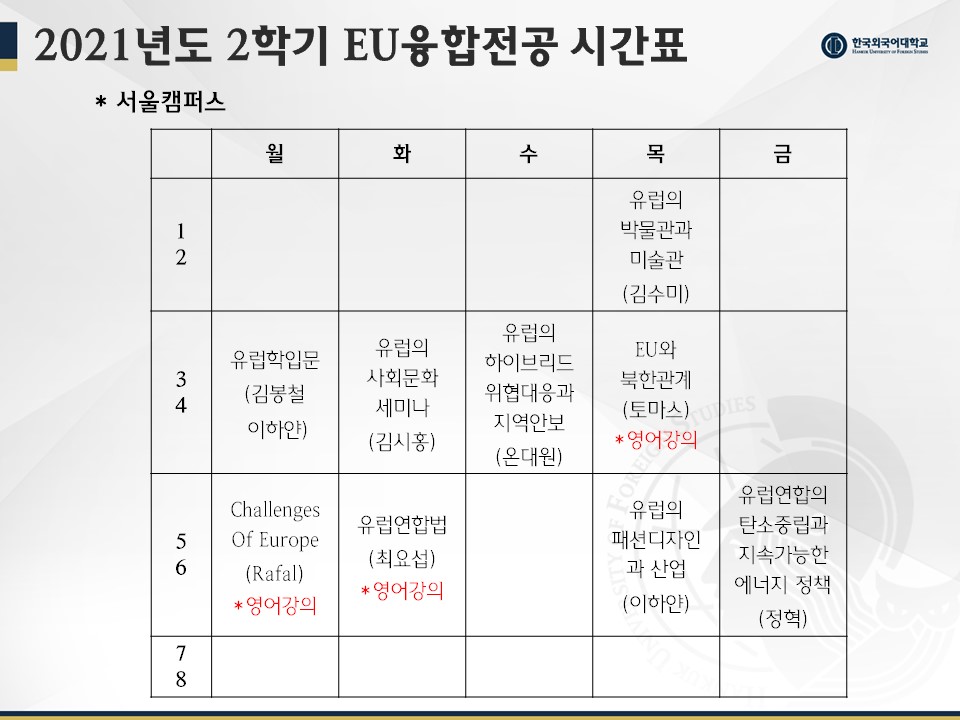

인사말
한국외국어대학교의 유럽연합(EU) 연구소는 유서가 깊은 유럽학 교육·연구 기관입니다. 초기의 유럽공동체 출범을 목도하고 본교의 선학들은 1960년대 어려운 여건 속에서 ‘독일 연구소’와 ‘프랑스 연구소’를 통해 유럽에 대한 지역학 연구를 시작했습니다. 이후 1993년에는 EU 체제의 설립과 함께 ‘서유럽 연구소’를 설립하여 유럽통합과 EU에 관한 독자적인 연구시설을 갖췄습니다. 1999년에는 EU의 회원국 확대를 반영하여 연구소 이름을 오늘날의 ‘EU 연구소’로 개칭하였고, 이를 통해 EU 체제는 물론 서유럽과 중동부유럽 EU 회원국의 정치, 경제, 사회, 문화를 연구하는 연구기관으로써의 위상을 갖추었습니다. 즉 EU 연구소는 전문 연구기관으로서 지난 70여년 간 유럽통합의 발전 과정에 부응하며 유럽학 연구를 주도해 왔습니다.
유럽통합은 갈등과 대립으로 점철된 유럽 국가들이 협상과 설득을 통해 새로운 거버넌스인 EU 체제를 구현해 온 과정입니다. 유럽통합의 선구자들이 제기한 질문은 제국주의와 전쟁으로 얼룩진 근대사를 벗어나, 어떻게 공존을 모색할 것인가입니다. 이러한 역사적 특수성 속에서 협상과 설득 같은 다원주의에 기초하여 탄생한 것이 오늘날의 EU 체제입니다. 그렇기 때문에 유럽통합은 아시아 등 다른 지역의 국제관계에 많은 시사점을 제공해 왔습니다. 반면에 EU는 발전과정에서 다양한 도전과 한계에 직면했고, 이러한 문제점은 제도적 개혁과 변화의 동인을 제공했습니다. 이 과정은 정치, 경제, 사회, 문화 등 다양한 영역에서 많은 이론과 정책 연구의 대상이 되었습니다. 또한 다양한 분야로 확장, 심화된 EU의 정책들은 오늘날 유럽학(EU Studies)이 정립되는 배경이 되었습니다.
유럽은 인류가 사회과학 차원에서 모든 사회적 실험을 다 해 본 곳이라고 말해도 과언이 아닙니다. 근대 자본주의가 태동, 발전한 곳도, 과도한 자본주의 이면에 있는 부작용이 제일 먼저 나타난 곳도 유럽입니다. 이러한 부작용에 대한 반발로 사회주의에 관한 논쟁과 복지국가의 필요성이 등장했고, 국가와 시장 간의 관계, 시민사회 구성을 위한 치열한 고민이 있었습니다. 따라서 유럽은 인문사회과학에 있어 수많은 사례연구의 대상이 됩니다.
지난 30년 이상 진행되어 온 세계화는 오늘날 큰 변화에 직면해 있습니다. 국가 간의 패권경쟁, 지정학적 긴장과 분쟁, 기후변화 등이 바로 그것입니다. 유럽도 큰 변화와 도전에 직면해 있습니다. ‘유럽은 흐린 날에만 움직인다’라는 말이 있든 이러한 대외적 도전은 EU 체제의 변화와 개혁의 배경이 됩니다. 한편 EU는 유럽의 평화와 안정을 목적으로 설립되어 민주주의와 인권 등 ‘유럽의 가치’를 해외에 확산시키기 위해 노력해 왔습니다. 2012년 EU가 지역공동체로서 최초로 노벨평화상을 수상한 점은 이러한 노력에 대한 인정이라고 봅니다.
유럽의 변화를 잘 파악하되, 긴 역사적 흐름 속에서 해석해 내는 것은 지역학 전문 연구기관으로서의 소명입니다. 또한 유럽에 대한 관찰을 통해 한국 사회에 새로운 이슈와 시각을 전달하는 것도 저희 연구소의 사명이라고 생각합니다. 한국외국어대학교의 EU 연구소는 외국학에 특화된 본교의 특성을 최대한 살려 유럽학 연구에 기여하고자 합니다. 특히 EU의 24개 공용어 중 18개 언어에 대해 전공 학과를 갖춘 만큼 외국어를 활용하여 연구와 교육, 해외 현지 교육·연구기관과의 네트워크 확산에 힘쓰겠습니다. 이를 통해 한국과 유럽을 잇는 징검다리가 될 수 있도록 사회적 소임을 다하겠습니다.
EU 연구소장
강 유 덕
The Institute of European Union (EU) Studies at Hankuk University of Foreign Studies (HUFS) holds a distinguished position as an institution dedicated to education and research in European studies, boasting a rich historical legacy. Its origins trace back to the nascent stages of the European Community when professors at HUFS embarked on regional studies concerning Europe amidst challenging conditions in the 1960s. The 'German Institute' and 'French Institute' were established as precursors at HUFS, marking the commencement of our academic exploration in this field. Subsequently, in 1993, aligning with the establishment of the EU by the Treaty of Maastricht, the 'Institute of Western European Studies' was founded, equipped with autonomous research facilities focused on European integration and the EU.
In 1999, in response to the enlargement of the EU towards Central and Eastern Europe, the institute underwent a nomenclatural transformation, evolving into the present-day 'Institute of EU Studies.' This name change emphasized its dedication to comprehensive research, covering the politics, economy, society, and culture of both the EU system and its member states in Western and Eastern Europe. Since then, the Institute of EU Studies has consistently fulfilled its role as a specialized research institution, aligning its focus with the dynamic processes of European integration.
The European integration represents a paradigm shift from historical conflicts to a novel governance system. Foundig fathers of the EU posed fundamental questions about fostering coexistence beyond a history marked by imperialism and war. The EU system emerged from these inquiries, rooted in pluralistic values such as negotiation and persuasion, holding profound implications for international relations, particularly in Asia and other regions.
Despite its achievements, the EU encountered multifaceted challenges during its developmental trajectory, necessitating institutional reform and transformation. Scholars across various domains have extensively researched and analyzed this intricate evolution. The EU's policies, spanning diverse fields, laid the groundwork for the establishment of contemporary European Studies (EU Studies).
Europe stands as a crucible for diverse social experiments within the realm of social science. It witnessed the birth and evolution of modern capitalism, positioning Europe as the epicenter of debates on socialism, the welfare state, and the intricate interplay between the state and the market. Consequently, Europe remains a focal point for extensive case studies within the humanities and social sciences.
The ongoing process of globalization, spanning more than three decades, is currently experiencing transformative shifts marked by geopolitical tensions, climate change, and hegemonic competitions. Europe, too, is confronted with significant changes and challenges. As it is said that 'Europe only moves on rainy days,' these challenges underscore the impetus for reforms in the EU system. It is noteworthy that the EU's inception, driven by the pursuit of peace and stability in Europe, coupled with endeavors to disseminate 'European values' such as democracy and human rights globally. The EU's receipt of the Nobel Peace Prize in 2012 attests to the recognition of these endeavors.
Our mission as a specialized research institute in regional studies involves cultivating a comprehensive understanding of evolving European dynamics within the context of historical trends. We perceive it as our responsibility to disseminate emerging issues and perspectives to Korean society through our observations of Europe. The Institute of EU Studies at HUFS will strive to make significant contributions to European studies research by capitalizing on the university's specialization in foreign studies. With language departments for 18 of the 24 official languages of the EU, we are dedicated to harnessing these linguistic resources for research and education, establishing connections with educational and research institutions worldwide. Through these concerted efforts, we aspire to fulfill our social responsibility, serving as a bridge between Korea and Europe.
Director, Institute of EU Studies
Yoo-Duk Kang








 l 연구소 소개 l 인사말
l 연구소 소개 l 인사말
